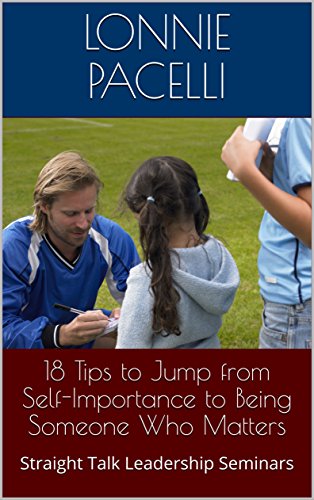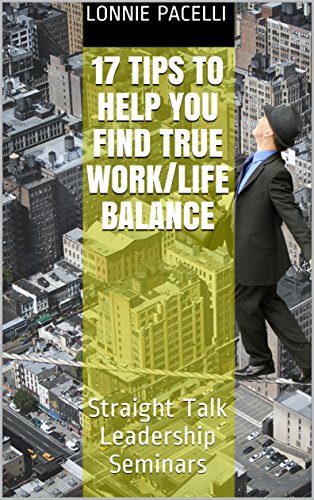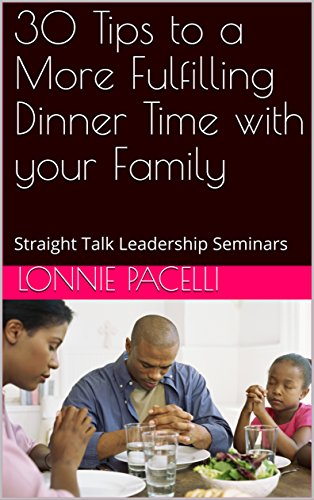
Get 18 concise and easy to understand tips to help you make the leap from being self-important to being someone who matters. Use the handy self-assessment questions to help you identify where you need to improve and put in place the change needed to be a more effective leader.
Summary: I spent the first 11 years of my career at Accenture. I started in the firm when I was 20 years old and enjoyed a number of successes (and just as many failures) throughout my career. From the day I was hired at Accenture I saw myself as “partner track” material and just knew that someday I would be a partner in the firm. Even with getting married and having two children, I dreamed of the day I would be a partner and was willing to take time away from my wife and children to make that happen. Then some things happened…. In 1993 I was a senior manager based in Chicago in the midst of being transferred to Seattle. We had a very active three-year-old and a newborn at home. My wife very much enjoyed Chicago and wasn’t too excited about being transferred to Seattle. Just prior to moving to Seattle, my Father unexpectedly died. Two weeks after we moved to Seattle, I got staffed on an engagement….in Los Angeles. The job was a real pressure cooker with sixteen-hour days and very tight timelines. So here I am still grieving over the loss of my father, working on a nightmare of a job in LA five days a week with my wife and two kids in a new house in a city that my wife didn’t want to be in. On one Thursday evening after working until 1a.m. it all came crashing down. I was lying in my hotel room wishing that I could just end it all to escape the pressure. I could actually hear voices saying “kill yourself, do it, do it, do it.” Talk about your wake-up call. I left voicemails that evening for the partners I worked for and told them I needed to get away. I left the engagement the next day, went back to Seattle, took three weeks off work and sought counseling to help me through my breakdown. While I got through the breakdown fine and returned to work after three weeks, I started to view life a bit differently. What became clear to me is there is a difference between being important and living a life that truly matters. So by now some of you may be saying, “What’s the difference? How could someone be important but not matter?” For me, it comes down to a simple premise: Looking out for #1 will lead to a life of self-importance. Looking out for others will lead to a life that matters. Now, I’m not advocating that you go sell all of your possessions and take up a life as a hermit. I personally enjoy some of the finer things in life and live a life that in many societies would be considered luxurious. What is different, though, is what I let drive and control me. I have made a personal decision that money, power or fame isn’t going to drive my actions. What does drive my actions is the legacy I leave and the impact I will have on others long after I have departed this life. I’d much rather have one of my kids say, “He is a great Dad,” my wife say, “What a wonderful husband,” or a friend say “He helped me to help myself,” than all of the money and power on earth. That’s what leading a life that matters is all about. Let’s cut to the chase on this:
0 Comments

Get 17 concise and easy to understand tips to help you achieve your quest to find true work/life balance. Use the handy self-assessment questions to help you identify where you need to improve and put in place the change needed to be a more effective leader.
Summary: So let’s talk about over-used terms for a minute. If you’ve been in the business world since the mid 1990s you’ve likely heard your management espouse the desire for employees to achieve greater work/life balance. Many U.S. companies have adopted programs to help employees strike a better life balance by providing health club benefits, entertainment discount programs, and additional time off for events such as the birth of a child. Despite all this, Americans are of the most overworked and flat-out busy people on earth, recently surpassing the Japanese and long surpassing the Europeans. With all this discussion of work/life balance, how can we in the U.S. also be of the most overworked people in the world? The answer is pretty simple; many of us talk work/life balance, but don’t live work/life balance primarily because we don’t know how to do it. First let’s get clear on the primary purpose of achieving work/life balance. It’s about minimizing stress in your life. Much of the stress in a typical person’s life is derived from work. You can say you’ve got work/life balance, but in addition to working full-time, you might participate in many activities with the kids, volunteer at the local homeless shelter, and exercise five days a week. If you’re feeling stressed and tired you haven’t achieved the primary intent of work/life balance, which is to reduce stress. All you have done is balanced the degree of stress you have in your work life with the stress you have in your non-work life. But at least the stress is balanced :-). Before we get too deep in this seminar, I want to get a couple of points on the table: Work/life balance doesn’t mean you never have to burn the midnight oil to get a project done. There will be times you will need to work hard to meet a deadline. What work/life balance does mean, though, is that burning the midnight oil will only be an exception, not a regular event. Achieving work/life balance doesn’t give you a get-out-of-jail-free card to not work hard or only work a few hours a week. We were meant to work and to provide for ourselves. It just means that work is done in moderation and not to an extreme. Realizing the quest for work/life balance means doing some serious soul searching. The first focus topic in this action guide is designed to get you thinking about what is truly important to you. If you acknowledge you are a workaholic and don’t want to change, then this action guide will probably be meaningless to you. If you do want to change, though, you’ll get a few helpful nuggets from what you’re about to read. This seminar is very personal to me as I am a recovering workaholic. I have learned many lessons the hard way in realizing my own personal quest for work/life balance and hope that you might find a few pearls which help you better achieve the low-stress balance you desire. 
Get 30 tips to enhance your dinner time experience and use the dinner table as a place to connect with your family. Some tips may resonate with you, some may not be applicable at all. Pick and choose the most impactful tips and improve your dinner time experience with your family.
Summary: Both my wife and I were raised in very different families. My wife was raised in a soft-spoken, Christian household while I was raised in a very loud, Italian household. Though we came from very different backgrounds, we both grew up in households where dinnertime was not only a time of eating, but a time to connect as a family. While there were some differences in our respective homes (think “My Big Fat Greek Wedding,” replace the word “Greek” with “Italian” and the movie is now about my wife and me) we shared a love for sitting down as a family. As we had children, we adjusted our routine to ensure we all sat down at the same time, prayed together, and enjoyed servings of conversation along with our meat and potatoes. When our kids became teenagers, we really began to see the results of years of dinner time as a family. Dinner is more than filling the gullet; it is a place where we connect, talk about issues, and just have fun together. On many days this is the only time we are all together because of our busy lives. Take away that time and we lose valuable family connections. If these connections are not made, life-long negative consequences could result. In this mini-seminar I outline 30 tips to enhance your dinner time experience and use the dinner table as a place to connect with your family. Some tips may resonate with you, some may not be applicable at all. The goal isn’t to apply everything in this mini-seminar at your next meal. My hope is that you’ll glean a few new ideas which will help you enhance your dinner time experience and improve your relationship as a family. |
Books and SeminarsSee all Lonnie's books and seminars on Amazon and iTunes Topics
All
|
Lonnie Pacelli - Building Thriving Leaders™
Insightful | Creative | Direct Advice to Help Leaders Help Themselves
Keynote Speaker | Board Director | Autism Advocate | Author | Project Management Expert | Microsoft/Accenture Veteran
See his books on Amazon
Insightful | Creative | Direct Advice to Help Leaders Help Themselves
Keynote Speaker | Board Director | Autism Advocate | Author | Project Management Expert | Microsoft/Accenture Veteran
See his books on Amazon
Services |
About
|
© COPYRIGHT 2019. ALL RIGHTS RESERVED.
We are a participant in the Amazon Services LLC Associates Program, an affiliate advertising program designed to provide a means for us to earn fees by linking to Amazon.com and affiliated sites.
|








 RSS Feed
RSS Feed